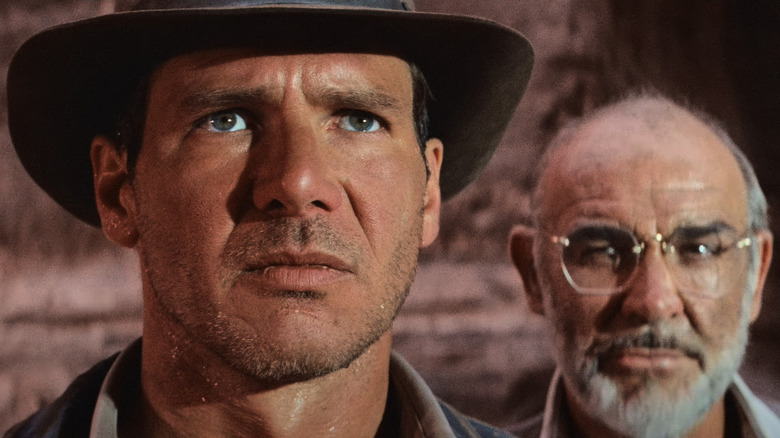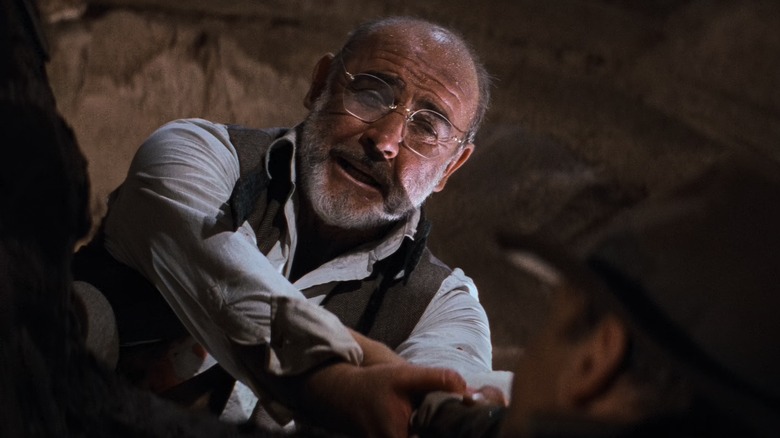The Last Crusade's Climax Was Saved By Giving Indiana Jones A Dad
Though Indiana Jones has a fifth movie on the way in 2023, his original '80s trilogy ended with "Indiana Jones and the Last Crusade," which meant the climax of that film was also intended to be the series climax ... at least until a certain Crystal Skull reared its ugly head (and no, we're not talking about Dan Aykroyd's Crystal Head Vodka).
Director Steven Spielberg was not happy with how the second installment in the franchise, "Indiana Jones and the Temple of Doom," had turned out. In an interview published the day "The Last Crusade" hit theaters, he said, "There's not an ounce of my own personal feeling in Temple of Doom." So, in order to wrap up the whip-cracking archeologist's adventures for the time being, he found a more personal entry point for "The Last Crusade," one that built upon an existing preoccupation in his filmography with what we've called "absentee, workaholic, and neglectful fathers."
Enter: Henry Jones, Sr. (Sean Connery), a father who can't even be bothered to turn around from his desk after his teen son (River Phoenix as Indy) has just survived being chased through a circus train by grave robbers. Speaking to Empire, the adult Indy, Harrison Ford, observed that, despite its Holy Grail MacGuffin, "The Last Crusade" is really at heart "a relationship film, between a son and a father." Spielberg revealed:
"The dad thing was my idea. The Grail doesn't offer a lot of special effects and doesn't promise a huge physical climax. I just thought that the Grail that everybody seeks could be a metaphor for a son seeking reconciliation with a father and a father seeking reconciliation with a son. It also gave me a chance to suggest Sean Connery. Who else but [James] Bond could have been worthy enough to play Indiana Jones' dad?"
Yoda Jones, Sr.
Ford, who also starred in the original "Star Wars" trilogy, of course, said that an early concept for "The Last Crusade" envisioned Indy's dad as more of "a wise old Yoda type." Henry Jones, Sr., is still someone for whom the pen is mightier than the sword, at least when it comes to fighting Nazis "in the belly of that steel beast," which is to say, a tank headed for a cliff dive. However, Ford conceded that Yoda Jones, Sr. would not "have worked as well as having somebody of the strength of Sean."
Associate producer Kathleen Kennedy, who would go on to become the president of Lucasfilm years later, noted that James Bond was "the inspiration behind the whole [Indiana Jones] series to begin with" and "a great way to pull that all together." Connery added:
"They had to be very sure what they were going for. A more academic-type casting would have been somebody like Gregory Peck, but you needed somebody that Harrison could bounce off. Henry had to be something pretty special to produce Indy. Also, he had to be something different. When Indy says, 'You never talked to me,' I say, 'Well, you weren't interesting until you were 19.' Which is right below the belt, but probably right on the nose."
Connery added a wonderful dynamic to "Indiana Jones and the Last Crusade," so much so that, for some fans, his installment may actually be the high point of the series, even more so than the classic first film, "Raiders of the Lost Ark." Using the Grail as a metaphor for reconciliation between father and son and grounding the climax of "The Last Crusade" in those emotional stakes added to the catharsis and gave the whole '80s Indiana Jones trilogy a satisfying end.

